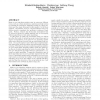Free Online Productivity Tools
i2Speak
i2Symbol
i2OCR
iTex2Img
iWeb2Print
iWeb2Shot
i2Type
iPdf2Split
iPdf2Merge
i2Bopomofo
i2Arabic
i2Style
i2Image
i2PDF
iLatex2Rtf
Sci2ools
114
click to vote
CORR
2011
Springer
2011
Springer
Peer Effects and Stability in Matching Markets
Many-to-one matching markets exist in numerous different forms, such as college admissions, matching medical interns to hospitals for residencies, assigning housing to college students, and the classic firms and workers market. In the these markets, externalities such as complementarities and peer effects severely complicate the preference ordering of each agent. Further, research has shown that externalities lead to serious problems for market stability and for developing efficient algorithms to find stable matchings. In this paper we make the observation that peer effects are often the result of underlying social connections, and we explore a formulation of the many-to-one matching market where peer effects are derived from an underlying social network. Our model captures peer effects and complementarities using utility functions rather than traditional preference ordering. With this model and considering pairwise stability, we prove that stable matchings always exist and cha...
| Added | 13 May 2011 |
| Updated | 13 May 2011 |
| Type | Journal |
| Year | 2011 |
| Where | CORR |
| Authors | Elizabeth Bodine-Baron, Christina Lee, Anthony Chong, Babak Hassibi, Adam Wierman |
Comments (0)

